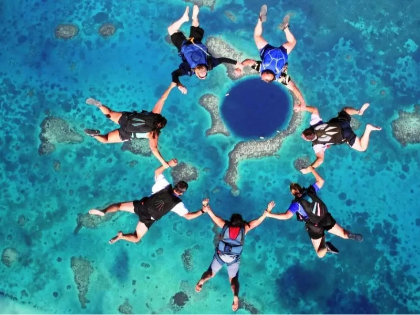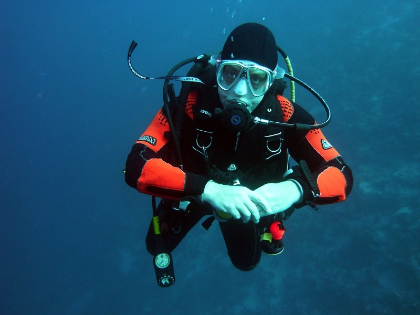Dive TripCarbon Offsetting: Reducing Your Environmental Impact
Find environmentally friendly methods to help lessening the effects of your diving trip. There are lots of easy actions you can do to significantly change things, from buying reusable dive gear to helping out with beach clean-ups! Through investments in projects lowering greenhouse gas levels, carbon offset programmes balance inevitable emissions. Working with ClimateCare, UK Specialist Dive Tour Operator Diverse Travel recently introduced this innovative initiative to produce positive social and environmental change.
1. Cut the food you waste

2. Bring reusable cutlery
 Most people know by now the damage single-use plastics are causing to marine environments, hence when it comes to dining and drinking on your diving trip think about carrying your own reusable items. Select a set of reusable cutlery, an environmentally friendly tote bag, and a vacuum-insulated water bottle that will keep your drink cool or hot for more.
Furthermore, think about buying from companies that give sustainability first priority in manufacturing their goods and invest in robust equipment that will last you a long time. Using ecologically friendly cleaning products is particularly crucial since even minute levels of harmful cleaners can upset the delicate equilibrium of nutrients under sea.
As a diver, you may also help local marine conservation initiatives by volunteering for clean-up dives or making donations to groups that work to preserve aquatic life. Covering up with a rash guard or sun hat will help you further defend yourself from sun exposure and apply sunscreen free of chemicals like oxybenzone and octinoxate, which damage coral.
Most people know by now the damage single-use plastics are causing to marine environments, hence when it comes to dining and drinking on your diving trip think about carrying your own reusable items. Select a set of reusable cutlery, an environmentally friendly tote bag, and a vacuum-insulated water bottle that will keep your drink cool or hot for more.
Furthermore, think about buying from companies that give sustainability first priority in manufacturing their goods and invest in robust equipment that will last you a long time. Using ecologically friendly cleaning products is particularly crucial since even minute levels of harmful cleaners can upset the delicate equilibrium of nutrients under sea.
As a diver, you may also help local marine conservation initiatives by volunteering for clean-up dives or making donations to groups that work to preserve aquatic life. Covering up with a rash guard or sun hat will help you further defend yourself from sun exposure and apply sunscreen free of chemicals like oxybenzone and octinoxate, which damage coral.
3. Cut your commute time
 Though it costs more, visiting far-off locations lets us see different worlds and cultures. A major share of world greenhouse gas emissions come from air travel, hence minimising your contribution requires lowering the carbon footprint you produce throughout your trip.
Think about employing a carbon offset service to offset the emissions you create on your flight booking. Projects aiming at either removing or lowering CO2 from the environment get this fee invested in them.
If you have time, attempt to get about on a bike or foot. When at all possible, meantime, rely on public transportation—especially low-emission versions like trains and buses.
Another excellent approach to reduce your effect when on travel is light packing. Reducing your baggage fees and enabling more sustainable travel depend on avoiding big bags! Another eco-friendly approach to savour your trips is using the nearby restaurants with plant-based cuisine.
Though it costs more, visiting far-off locations lets us see different worlds and cultures. A major share of world greenhouse gas emissions come from air travel, hence minimising your contribution requires lowering the carbon footprint you produce throughout your trip.
Think about employing a carbon offset service to offset the emissions you create on your flight booking. Projects aiming at either removing or lowering CO2 from the environment get this fee invested in them.
If you have time, attempt to get about on a bike or foot. When at all possible, meantime, rely on public transportation—especially low-emission versions like trains and buses.
Another excellent approach to reduce your effect when on travel is light packing. Reducing your baggage fees and enabling more sustainable travel depend on avoiding big bags! Another eco-friendly approach to savour your trips is using the nearby restaurants with plant-based cuisine.
4. Offer donations
 Working with environmentally-sensitive resorts that are dedicated to sustainability helps some travel agencies, such Zu blu and Reef-World's Green Fins initiative, lower their environmental impact. This communicates strongly to other travel companies that sustainability is the way ahead.
On their website, airline companies including South-west provide a carbon offset option whereby you can donate money or Rapid Rewards points towards initiatives such fuel-efficient cookstoves and animal waste conversion into renewable energy. Still, they spew millions of metric tonnes of pollution annually into the atmosphere.
Other companies focused in carbon offsetting also include myclimate, Cool Effect, Sustainable Travel International, Native Energy, and Carbonfund. These companies provide a broad spectrum of third-party verified, permanent, extra, and forestry carbon projects compliant with top carbon offsetting guidelines. But before depending on carbon offsetting, attempt to directly lower your carbon impact. Direct approaches are more affordable and have more effect.
Working with environmentally-sensitive resorts that are dedicated to sustainability helps some travel agencies, such Zu blu and Reef-World's Green Fins initiative, lower their environmental impact. This communicates strongly to other travel companies that sustainability is the way ahead.
On their website, airline companies including South-west provide a carbon offset option whereby you can donate money or Rapid Rewards points towards initiatives such fuel-efficient cookstoves and animal waste conversion into renewable energy. Still, they spew millions of metric tonnes of pollution annually into the atmosphere.
Other companies focused in carbon offsetting also include myclimate, Cool Effect, Sustainable Travel International, Native Energy, and Carbonfund. These companies provide a broad spectrum of third-party verified, permanent, extra, and forestry carbon projects compliant with top carbon offsetting guidelines. But before depending on carbon offsetting, attempt to directly lower your carbon impact. Direct approaches are more affordable and have more effect.







